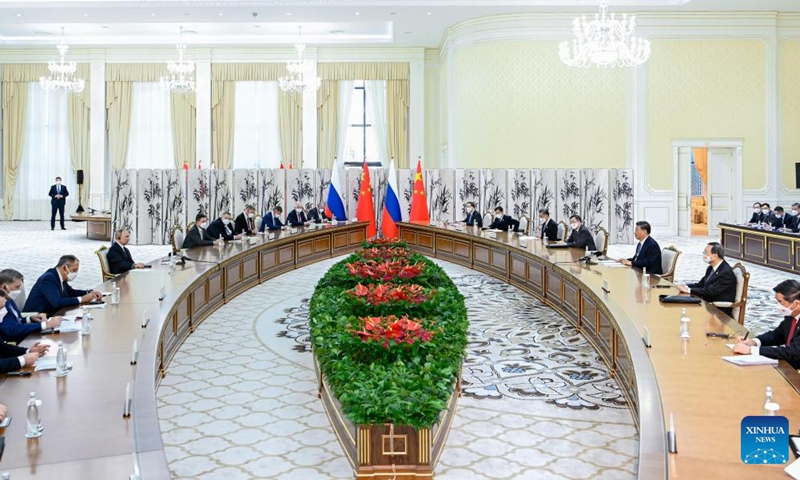
Chinese President Xi Jinping meets with Russian President Vladimir Putin at Forumlar Majmuasi Complex in Samarkand, Uzbekistan, Sept. 15, 2022. Xi met with Putin in Samarkand to exchange views on China-Russia relations and international and regional issues of shared interest.(Photo: Xinhua)
Chinese President Xi Jinping said China is ready to work with Russia in extending strong support to each other on issues concerning their respective core interests when he met with Russian President Vladimir Putin on the sidelines of the Shanghai Cooperation Organisation (SCO) summit in the ancient Silk Road city of Samarkand, Uzbekistan on Thursday.
During the summit, Xi said China is also willing to deepen pragmatic cooperation in such areas as trade, agriculture and connectivity, the Xinhua News Agency reported.
Xi called for both sides to strengthen coordination within the SCO, the Conference on Interaction and Confidence Building Measures in Asia, BRICS and other multilateral mechanisms to promote solidarity and mutual trust among related parties, according to Xinhua.
Xi also said China and Russia should expand pragmatic cooperation, safeguard the security and interests of the region, and preserve the common interests of developing countries and emerging market countries, according to Xinhua
Analysts said the two leaders' summit is a crucial guarantee for the steady development of bilateral ties, signaling that China-Russia relations will not be affected by external noises. At the same time, China will also be on high alert against attempts by the US and the West to tie China and Russia into a political and military bloc and drive a wedge between the pair and the rest of the world.
The first face-to-face meeting between the two leaders since the start of the Ukraine conflict in February came after US house speaker Nancy Pelosi's provocative trip to Taiwan and a new round of updated US arms sale packages to the island.
Putin expressed Russia's support for the one-China principle, and denounced US provocations in the Taiwan Straits and its attempts to create a "unipolar world", according to Reuters and AFP reports. Putin also spoke highly of China's balanced stance in the Ukraine crisis, believing that the meeting with Xi will further enhance bilateral ties.
Analysts said that Putin's words about China's balanced stance on the Ukraine crisis are objective, as China has always held the attitude of multiple concerns and understanding, and hopes to resolve conflicts peacefully. In the case of Taiwan question, the rights and wrongs are very clear. Putin's remarks reflected the China-Russia comprehensive strategic partnership of coordination for a new era.
"The face-to-face exchanges between two leaders are an important guarantee for the steady progress of China-Russia relations," a Beijing-based international relations expert told the Global Times on Thursday, requesting anonymity.
Comparing it to a previous phone conversation between the two leaders in June, ahead of the US-led NATO summit, experts said the latest Xi-Putin meeting outlined that closer ties between China and Russia would inject more stability and certainty into a world of turbulence.
China-Russia relations are at their best in history, and the bilateral cooperation in security, politics, economy, culture and other aspects will remain unaffected as always, and move toward a healthier direction, Yang Jin, an associate research fellow at the Institute of Russian, Eastern European and Central Asian Studies at the Chinese Academy of Social Sciences, told the Global Times on Thursday.
However, experts warn that China has many friends in the world in addition to Russia and China needs to prevent the West from propagandizing China and Russia as a political and military bloc. Before the leaders' summits, some US media outlets such as CNN and Bloomberg said the two leaders were attempting to "create a new world order" and "counter US dominance."
Even before the Ukraine crisis, the US and some Western countries hadtried to drive a wedge between China and Russia, fearing the pair would get closer. But after the Russia-Ukraine conflict broke out, they tied China and Russia into one camp, playing the pair off against the rest of the world, Yang said.
China's interests are worldwide, and it can cooperate with Western countries on economic, cultural and even some major security issues, but there is no reason why China can't strengthen cooperation and exchanges with Russia, which also has the right to interact with the world, the Beijing-based expert said.
What needs to be said is that China upholds independent diplomacy and opposes bloc confrontation and the so-called alliance. The current China-Russian relationship has been formed gradually with the development of history and the consideration of national interests, not in response to the Russia-Ukraine conflict, nor to the containment efforts of the US, he said.
There are great prospects for political cooperation between China and Russia in relation to the global and regional order, such as through the UN and SCO. Through the China-proposed Belt and Road Initiative, the two sides can deepen cooperation in economy, science and technology, such as energy, grain imports, and currency swaps, Yang said.
The world is at a crossroads between building a sustainable balance of international security architecture in a way that benefits the security interests of nations and forming a kind of confrontational framework based on US' Cold War mentality. That makes coordination and cooperation among China, Russia and other Central Asia countries important, experts said.

